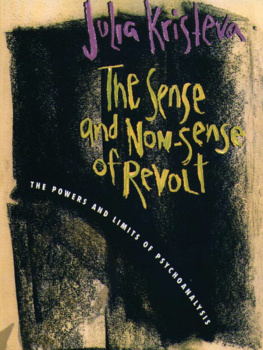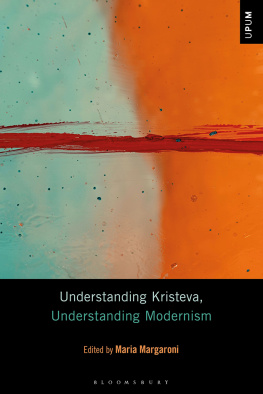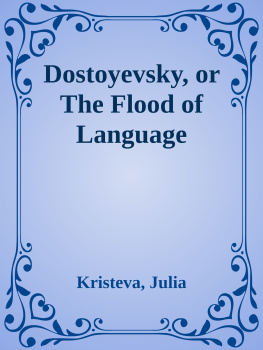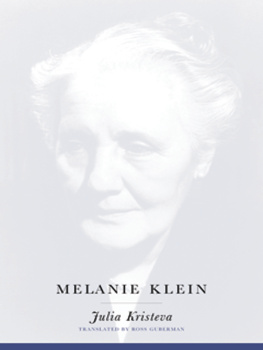THE SENSE AND NON-SENSE OF REVOLT
EUROPEAN PERSPECTIVES
European Perspectives
A Series in Social Thought and Cultural Criticism
Lawrence D. Kritzman, Editor
European Perspectives presents outstanding books by leading European thinkers. With both classic and contemporary works, the series aims to shape the major intellectual controversies of our day and to facilitate the tasks of historical understanding.
For a complete list of books in the series, see the .
Columbia University Press wishes to express its appreciation of assistance given by the government of France through Le Ministre de la Culture in the preparation of the translation.
Columbia University Press
Publishers Since 1893
New York Chichester, West Sussex
cup.columbia.edu
Sens et non-sens de la rvolte Librairie Arthme Fayard, 1996
Translation copyright 2000 Columbia University Press
All rights reserved
E-ISBN 978-0-231-51843-7
Library of Congress Cataloging-in-Publication Data Kristeva, Julia.
Sens et non-sens de la rvolte. English
The sense and non-sense of revolt / Julia Kristeva; translated by Jeanine Herman.
p. cm.(European perspectives) (The powers and limits of psychoanalysis; v. 1)
Includes bibliographical references and index.
ISBN 0-231-10996-2 (cloth)ISBN 0-231-10997-0 (paper)
1. Psychoanalysis and literatureFrance. 2. Psychoanalysis in literatureFrance. 3. French literature20th centuryHistory and criticism. I. Series.
PN56.P92 K75413 2000
840.9353dc21 99-049317
A Columbia University Press E-book.
CUP would be pleased to hear about your reading experience with this e-book at .
I would like to thank the students and auditors of my seminar at UFR, Sciences des Textes et Documents, Universit Paris 7-Denis Diderot, who made this work and its reconstruction possible. My thanks especially to Frdric Bensad, who recorded the lectures and faithfully reproduced the text, and to Raymonde Coudert, who edited the final manuscript.
J.K.
I wish to express my sincere thanks to Julia Kristeva for suggesting this project to me and to The MacDowell Colony, where many chapters of this book were translated. Thanks also to Jim Fletcher for the Aragon poems, Kristin Prevallet for the Freud archives, and David Strauss for The Language of Psycho-Analysis.
J.H.
The title of this book is meant to evoke the current political state and the lack of revolt that characterizes it. I promise not to elude this aspect of the problem, but I will approach things from a bit of a distance: from the roots of memory, which is nothing other than language and the unconscious. There are two facets to the reflections presented here: the first concerns psychoanalysis, its history, and its present state; the second takes into consideration different literary texts.
I will explain first what I mean by revolt and why the problematic of the sense and non-sense of revolt is inscribed in a psychoanalytical perspective. A number of major texts of our time can be approached from this angle, and I have selected the works of three well-known authors, each linked, though differently, to rebellion in the twentieth century: namely, Aragon, Sartre, and Barthes.
Some psychoanalytical questions will allow us a more profound approach to these three authors. To begin quite naturallysome might say provocativelyI think it would be useful to look into the etymology of the word revolt, a word that is widely used, if not banal, but that holds a few surprises. As a linguist by training, I sought out what linguists had to say about it. Two semantic shifts mark the evolution of the word: the first implies the notion of movement, the second, that of space and time.
Movement
The Latin verb volvere, which is at the origin of revolt, was initially far removed from politics. It produced derivatives with meaningssemessuch as curve, entourage, turn, return. In Old French, it can mean to envelop, curvature, vault, and even omelet, to roll, and to roll oneself in; the extensions go as far as to loaf about (galvauder), to repair, and vaudeville (vaudevire, refrain). If this surprises you, so much the better: surprise is never extraneous to revolt. Under Italian influence in the fifteenth and sixteenth centuries, volutus, volutain French volute, an architectural termas well as volta and voltare suggest the idea of circular movement and, by extension, temporal return. Volta also means timeas in one time or oncehence, turning back. Another direct derivative from Latin belongs in this lineage, the adjective volubilis, that which turns with ease, as in volubilitas linguae; the French equivalent is volubile (voluble). And volumen, sheets of paper scrolled around a stick, with the spatial meaning of wrapping or covering, results in volume, which comes to mean book in the thirteenth century. (In a second usage the word acquired the more abstract meaning of mass and thickness.) That the book has kinship with revolt might not be self-evident at first, but I will try to remedy this obfuscation.
The linguist Alain Rey stresses the cohesion of these diverse etymological evolutions, which start with a matrix and driving idea: to twist, roll, wrap (going back to the Sanskrit varutram, the Greek elutron, eiluma) and covering, an object that serves as a wrapping. The idea of twisting or enveloping, a topological and technical concept, is dominant; it can even be found in the name of the Swedish car company, Volvo, I roll. The old Indo-European forms *wel and *welu evoke a voluntary, artisanal act, resulting in the denomination of technical objects that protect and envelop. Today we are barely aware of the intrinsic links between revolution and helix, to rebel (se rvolter), and to wallow (se vautrer). But while I encourage readers to use etymology as a deciphering tool, do not rely solely on the appearance (or image) of a word and its meaning. Go further, go elsewhere, interpret. Interpretation, as I understand it, is itself a revolt.
Evolution, in its first attested appearance in 1536, inherits the semes I have just mentioned but concerns only the movement of troops being deployed and redeployed. More interesting as far as the modern meaning of the word is that to revolt and revolt, which come from Italian words that maintained the Latin meanings of to return and to exchange, imply a diversion at the outset that will soon be assimilated to a rejection of authority. In sixteenth-century French, to revolt is a pure Italianism and signifies to turn, to avert (to revolt the face elsewhere), or to roll up (thus hair was revolted). In 1501 the sense of a reversal of allegiancesiding with the enemy or religious abjurationis attested, close to the Italianism volte-face (about-face). Thus in Calvin (If a city or a country revolted from its prince...) or in Thodore de Bze (Those who revolt from Jesus Christ...) the idea of abjuration is linked to that of cycle and return, sometimes indicating only a change of party. In the psychological sense, the word contains an idea of violence and excess in relation to a norm and corresponds to mouvoir (to move), hence meute (riot) for revolt.
In the sixteenth century, the word does not involve the notion of force but strictly indicates opposition: to leave (a party), to abjure (a belief), to turn away (from a dependency). Until the eighteenth century, the word revolt is not used for war, as is the series rebel, rebellion, but is used in the political and psychological domain: Its always been allowed by right of war to fire revolt between ones enemies, Laodice says to Arsino, in Corneilles Nicomedes.
The historical and political sense of the word prevails until the end of the seventeenth century and beginning of the eighteenth: in
Next page












